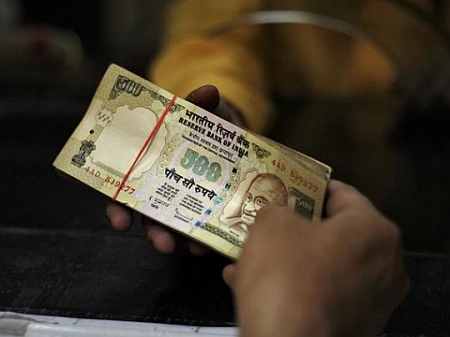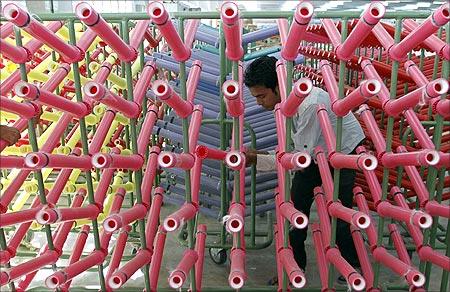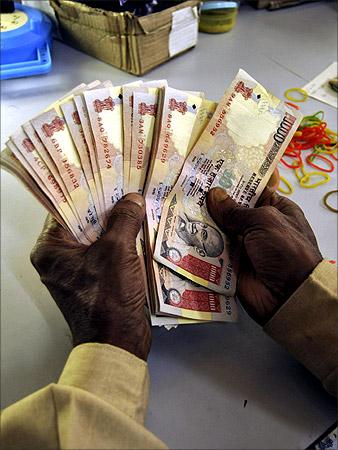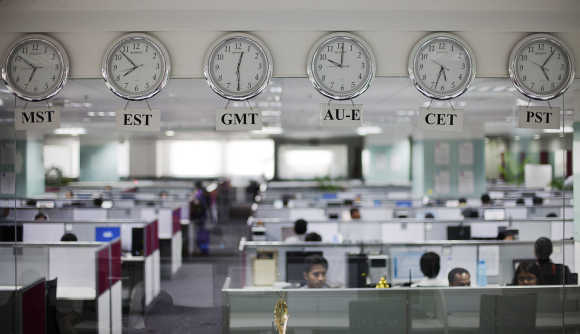 | « Back to article | Print this article |
Why one should invest in stocks now
The next six months are when to buy Indian stocks, writes Akash Prakash
India has become the whipping boy of both the international media and global investors.
No one has anything positive to say about the country or its investment prospects.
Given this all-pervasive air of negativity hanging over the country, it is tempting to try and construct a contrarian viewpoint.
Let's first break up the current investment environment into sentiment, positioning and valuation.
From a sentiment point of view, I have never seen things worse than right now, domestically or internationally.
The western media is having a field day criticising India, and after a series of missteps the country can do nothing right (at least in the eyes of global investors).
Click NEXT to read further. . .
Why one should invest in stocks now
At home, criticism has reached a new level, with economists falling over themselves in a race to cut India's growth rate/potential, and most investors and industrialists have written off any chance of improvement till 2014.
From a positioning standpoint, anyone with a choice seems to be underweight on India.
Most India managers have now broadened out to doing other markets, and India-only funds are an endangered species.
No India fund has any inflows of significance.
For most global macro funds, India is a unanimous short.
The country has delivered zero return (in dollars) in the last five years, and one can sense even long-term pools of capital losing patience.
Click NEXT to read further. . .
Why one should invest in stocks now
I know that, despite this deep sense of pessimism, India has still received $8 billion in inflows in the year to date, which remains a mystery -- who is investing?
Even domestically, I have never seen positioning lighter.
Wealth managers tell me that for the typical high net worth individual, equity allocations are sub-10 per cent (the lowest ever).
Data from the Reserve Bank of India indicate that the percentage of household financial assets in equities is at a 30-year low.
Trading volumes are also at multi-year lows.
There has not been a large, significant non-PSU initial public offering in years.
Click NEXT to read further. . .
Why one should invest in stocks now
Even sophisticated proprietary investors have no leveraged positions in the market, and perennial bulls have turned cautious.
Domestic investors continue to pile into real estate, gold and fixed-income assets, assuming the strong relative returns of these assets over the last five years will continue into perpetuity.
There is a huge wall of money sitting here, which will eventually gravitate to equities as this asset class starts delivering some performance.
From a valuation perspective, India can no longer be called expensive.
On whatever metric you look at, be it the price-earnings ratio, market capitalisation to GDP, or the price to book, India is now trading below long-term averages and within 10-15 per cent of the bottom we have seen in these metrics.
Click NEXT to read further. . .
Why one should invest in stocks now
At 12-12.5 times current-year earnings, even on an absolute basis, stocks are cheap.
While we still trade at a premium to the emerging-market averages, much of this is due to sectoral composition issues, making a like-to-like comparison difficult.
The valuation numbers are also broad market averages, which hide the huge valuation disparity within the markets.
Consumption-oriented sectors are trading at a huge premium, while most others are near their lows.
If one avoids consumption themes, constructing a portfolio of high-quality companies with valuation multiples of 10 or 11 times is quite possible.
Even in panic, India has never sustainably gone below 10 times earnings, and we are only 10 or 15 per cent away from those levels.
Click NEXT to read further. . .
Why one should invest in stocks now
From a contrarian perspective, the best investments are when things are cheap, sentiment and positioning are extremely adverse and things are getting better on the margin.
We clearly meet the first two criteria -- but are things getting better?
Yes they are, if only one were to look beyond the immediate quarter.
Interest rates have clearly peaked, and the monetary easing cycle has begun.
The RBI has already cut rates by 50 basis points and will possibly do more in its next meeting on June 18.
On any kind of 'monetary conditions' index, the easing is far greater, given the rupee's depreciation.
Click NEXT to read further. . .
Why one should invest in stocks now
Liquidity conditions have eased, and the worst should be over as the rupee stabilises and the RBI stops intervening and continues its open-market operations.
The worst of the rupee depreciation seems to be behind us (it has already moved 25 per cent since last July), global commodities including oil seem to be in decline -- and, unless Europe totally implodes, European Union bank deleveraging seems contained.
Falling oil prices take some pressure off the fiscal deficit, the current account deficit and the rupee, and we may have seen the worst of the negative pressure on all three variables for the year.
Click NEXT to read further. . .
Why one should invest in stocks now
Earnings estimates for the year ending March 2012 have actually been revised up marginally (post-March results being announced), and estimate cuts seem minuscule.
We may have finally reached the end of the continuous downward earnings revision cycle of the past three years.
Having grown by less than eight per cent per annum since 2008, corporate earnings and margins have normalised, with corporate profits as a share of GDP down over the last three years.
Any turn in the earnings cycle will produce a strong rebound in profit growth.
The 25 per cent rupee depreciation has also massively improved competitiveness of India Inc -- and will show in export and earnings numbers with a lag.
Click NEXT to read further. . .
Why one should invest in stocks now
It is very likely that over the coming three years, profit growth will accelerate sharply from the modest sub-eight per cent pace of 2008-11.
Even on the government front, it seems unlikely that things can get any worse.
On the margin, decisions are being taken (if from an incredibly low base), there seems to be a desire to control the fiscal, and an awareness that growth will get seriously constrained unless the government machinery begins to move.
On infrastructure, things are starting to move, and some of the more outlandish decisions -- be it on gas distribution or telecom -- are getting toned down.
Click NEXT to read further. . .
Why one should invest in stocks now
Thus, we have a market with huge negative sentiment embedded, seriously under-owned (both domestically and globally), within 10-15 per cent of its valuation lows -- but where things are starting to improve on the margin.
Unless the country were to totally implode both politically and economically, one would think you would make money from here on a three-year basis.
The situation in Europe will create huge volatility over the coming six months.
These bouts of market panic must be used to build a portfolio. I think it is now probably too late to sell.
To justify selling even here, one must really believe that India will only grow at five per cent and its government (any government) will never get its act together.
I don't subscribe to this dire prediction, and believe that the next six months must be used to buy, not sell, equities.
The author is fund manager and CEO of Amansa Capital










